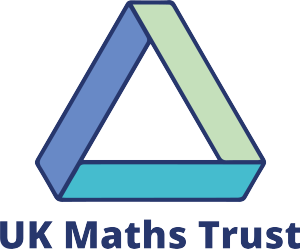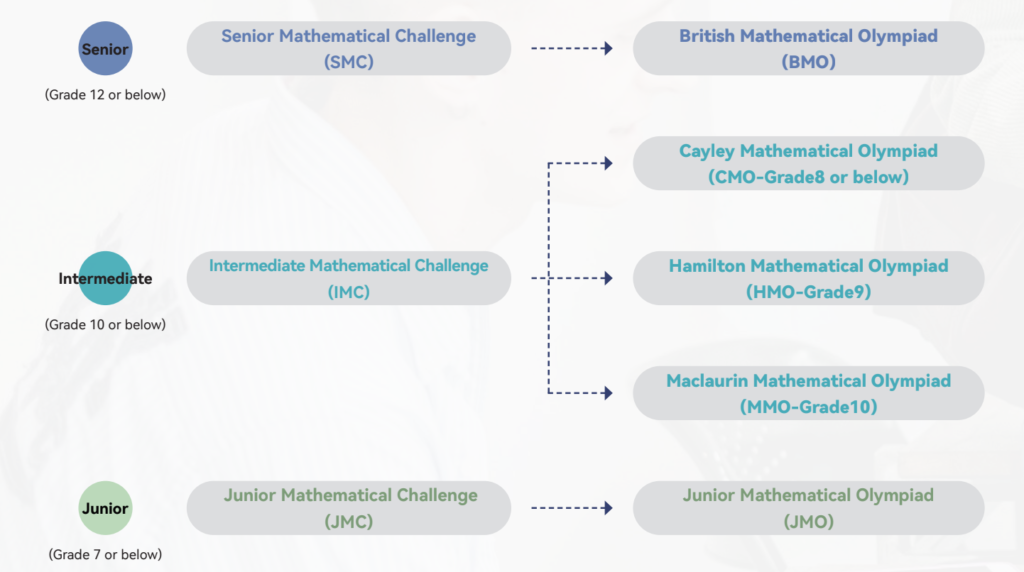

UKMT encourages mathematical reasoning, precision of thought, and in uence in using basic mathematical techniques to solve interesting problems. Among many mathematical challenges organized by UKMT, their biggest competitions are the Junior, Intermediate and Senior Mathematical Challenge (JMC/IMC/SMC), which have over 700,000 students from 6,000 schools each year, and are the UK’s most popular school Mathematical Challenges. The Junior Mathematical Challenge (JMC) is based on the knowledge learned in the classroom, allowing students to apply their mathematical knowledge to solve problems in a novel way. Most questions are easy for primary and secondary school students, but there are still some challenging questions designed to develop students’ critical thinking and mathematical reasoning skills, to stimulate their enthusiasm for learning mathematics and to enjoy solving puzzles. Students who achieve excellent results in JMC will be invited to participate in JMO.
The Junior Mathematical Olympiad (JMO) is an advanced challenge to JMC, which invites high achievers in the JMC to participate, encouraging students to improve their mathematical reasoning skills, re ne their logical thinking and acquire higher mathematical skills. The top performers in JMC have the opportunity to compete in JMO.

| Level | Student Eligibility | Date | Format |
|---|---|---|---|
| Senior Mathematical Challenge (SMC) | Grade 12 or below | 10 October, 2024(90mins) | 25 multiple choice questions |
| Intermediate Mathematical Challenge (IMC) | Grade 10 or below | 31 January, 2024(60mins) | 25 multiple choice questions |
| Junior Mathematical Challenge (JMC) | Grade 7 or below | 29 April, 2024(60mins) | 25 multiple choice questions |
The Junior Mathematical Challenge (JMC) is based on the knowledge from school. The problems promote critical thinking skills, often making students apply their knowledge in unfamiliar ways in order to solve a problem. Most questions are accessible to all students, while still remaining a challenge for more experienced students.
Awards
Global Awards (2024 award thresholds)
● Gold: 86+
● Silver: 70+
● Bronze: 57+
● Best in School: The top 1 participant in the school
● Best in Year: The top 1 participant in each grade in the school
Top 50% of UK participants will be awarded Gold, Silver and Bronze in the ratio 1:2:3. International participants will be awarded based on the UK thresholds. Students not amongst the high scorers will receive a Certificate of Participation in E-version.
The Intermediate Mathematical Challenge (IMC) is eligible for students in grade 10 or below. It encourages mathematical reasoning, precision of thought and fluency to make students think. The problems on the IMC are designed to make students think, most are accessible yet still challenge those with more experience. Additionally, IMC has several follow-on Rounds that are Cayley (CMO), Hamilton (HMO) and Maclaurin Maths Olympiads (MMO). These follow-on Rounds are 2 hour Challenges consisting of six Olympiad style problems requiring full written solutions. The questions featured in the CMO/HMO/MMO cover a range of mathematical topics and require students to apply their understanding of different areas of mathematics.
* General information
Time: January , 2025
Exam format: Online at home with 2 devices (test-taking device and monitoring device)
Format: Individual test, 25 multiple-choice questions
Participants: Grade 10 or below
Scoring Rules: Question 1-15, 5 points are awarded for each correct answer; Question 16-25, 6 points are awarded for each correct answer. Questions 16-20, each wrong answer loses 1 mark; Question 21-25, each wrong answer loses 2 points. Answers left blank will be marked as 0
Registration Deadline: January 15, 2025
Awards:
Global Awards (2023 award thresholds)
Top-Scoring Rules 50% of participants will be awarded Gold, Silver and Bronze in the ratio 1:2:3. International participants will be awarded based on the UK thresholds.
Students not amongst the high scorers will receive a Certificate of Participation in E-version.
The Senior Mathematical Challenge (SMC) is suitable for grade 12 or below students. It focuses on cultivating students' logical thinking and the problem-solving ability that apply mathematics precisely and fluently. The problems are highly challenging and flexible, typically cover key math topics in high school such as geometry, number theory, permutations, combinations and little algebra and applied problems, along with some stimulating problems that do not involve advanced mathematical knowledge for both beginners and experienced problem-solvers.
British Mathematical Challenge (BMO) is a follow-on round to the Senior Maths Challenge. It has two rounds: Round 1 and Round 2. Only the top 10% participants in BMO Round 1 can take part in Round 2. Differ from the multiple- choice questions of the SMC, BMO questions required students to write full proofs in order to assess students' overall mathematical ability. In the UK, only students with excellent SMC results are eligible to participate in BMO Round 1. International students can register for BMO Round 1 directly.
About Senior Mathematical Challenge (SMC)
Language: English
Date: October 3, 2024
Form: Online
Qualification: Grade 12 or below
Format: Individual test, 25 multiple-choice questions
Scoring Rules: Starting score 25 points, 4 points for correct
answer, 1 point deducted for wrong answer
Awards Global Awards (2023 thresholds)
● Gold: 80+
● Silver: 64+
● Bronze: 49+
● Best in School: The top 1 participant in the school
● Best in Year: The top 1 participant in each grade in the school
(Top-Scoring Rules 66% of participants will be awarded Gold, Silver and Bronze in the ratio 1:2:3. International participants will be awarded based on the UK thresholds. Students not amongst the high scorers will receive a Certificate of Participation in E-version.)